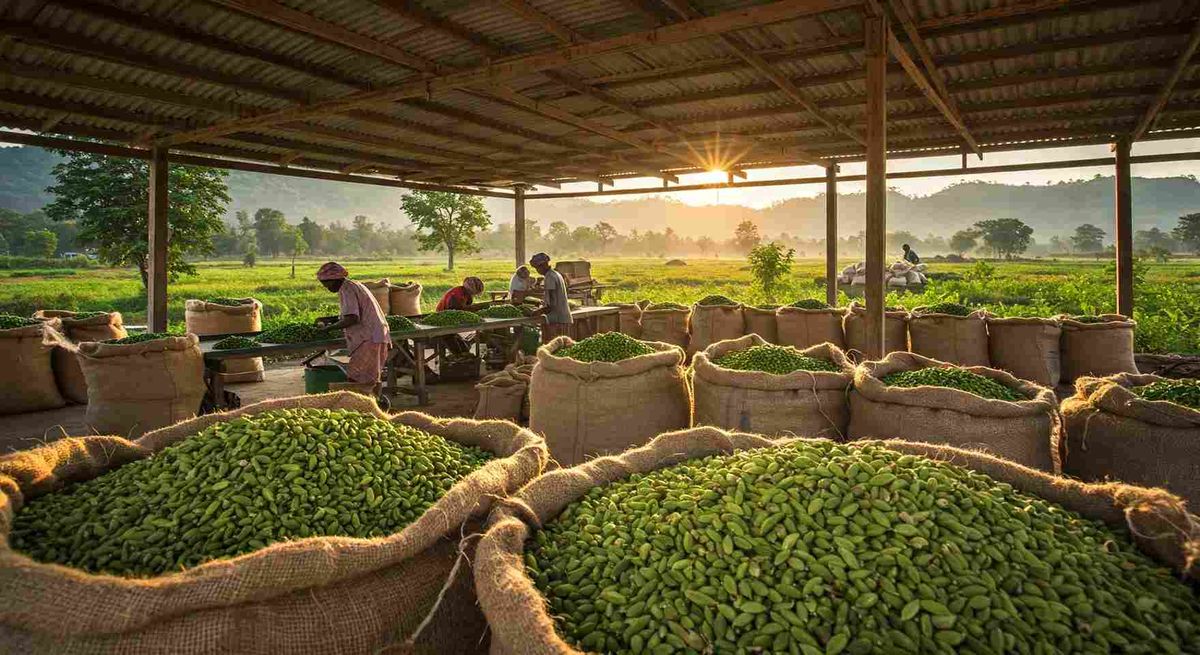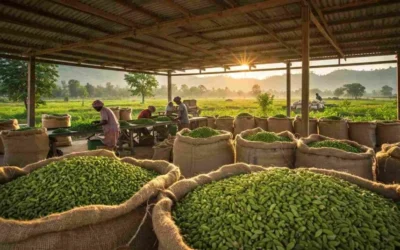Spices have always been a part of human history by adding warmth to our food, depth to our culture and even adding value to economics. From the golden complexation of turmeric to the sweet fragrance of vanilla, spices have travelled across countries influencing everything from the routes of trade to international empires.
But behind the tempting aroma of cinnamon and the rich taste of cardamom lies a reality that few of us should consider. The spices trade consists of exotic flavours and vibrant markets and carries a legacy of exploitation, destruction and corporate grasp.
Let’s go back to the moment when you sprinkled cardamom in your tea or baked it with a pinch of nutmeg last time. Do you guys have any idea where those spices came from? Were the farmers who harvested them paid fairly? Was the land treated with respect?
In this blog, we will explore the hidden world of the spice trade focusing specifically on cardamom which is one of the world’s most expensive and demanded spices. We will uncover the stories of farmers off-screen, the ethical dilemmas of the industry and what we as consumers can do to make a difference.

A Personal Connection
The Story of a Cardamom Farmer
Visualize a man whose name was Ramesh. He woke up before sunrise in the hills of Kerala and India, where his family also has been growing cardamom for past generations. His hands were chappy and dry from years of harvesting. His back aches because of the hard work he puts in during cultivation.
Ramesh has a very long day. He must pick the cardamom pods by hand with utmost care, making sure that no pods are damaged. Furthermore, after harvesting, he takes the harvested cardamom to the local trader by expecting to receive only a fraction of the cardamom’s actual worth. Those cardamom are later packed by the big companies and sell them in high prices ten times what Ramesh paid them.
Like many other spice farmers, Ramesh suffers to make ends meet. The high prices of fertilizers which fluctuate lead to unfair pricing from agents and competition from large-scale farmers leaving him speechless. His children drop out of school to help their father because Ramesh can’t afford an education.
Ramesh is not one but thousands of spice farmers are from the same story who belong to India, Guatemala and Sri Lanka. Therefore, farmers who work day and night tirelessly to provide us with abundant flavours we love are rarely appreciated and rewarded.
The Ethical Difficulty of the Spice Trade
1. Unfair wages and Labour exploitation
The reality is heartbreaking that many of the world’s spices come from developing countries where farmers are paid far below a living wage.
- Child Labor – Instead of going to school children work on spice farms in countries like India and Madagascar trapped in a cycle of poverty.
- Low Wages – Farmers often receive lower wages for their work for the spice that sells for several rupees in global markets.
- Harsh conditions – Spice cultivation is tiring because of long hours under the sun often with little to no protective equipment against pesticides.
The second largest producer of cardamom, Guatemala has revealed reports that the farmers earn as little as Rs.250 per day. Also, these workers do not have any social security, no health benefits, and no legal protections.
2. Environmental Damage
- Deforestation – The vast cultivation of spice across forest areas is threatening wildlife and biodiversity.
- Soil Erosion – The excessive use of chemical fertilizers and other pesticides leads to weakening the land making it less fertile.
- Water Pollution – Due to the overuse of chemicals in farming, rivers are contaminated which leads to contamination of drinking water near villages.
The most of places where the farming of cardamom is undertaken have been linked to deforestation. Once these places were consistent about an ecosystem now replaced commercial spice farms disturbing the nature for spice trade.
3. The Strength of Big Corporations
- It’s very common for many of us to buy spices from reputed brands assuming that they have good quality. As a result, the black truth behind this is that major spice companies prioritize profits over fair trading.
- Farmers are forced to sell their cultivated spices at low prices while agents and enterprises take a huge share of gains.
- Many brands do not disclose the origin of their spices due to a lack of transparency. Farmers are evacuated by the big brands by sourcing massive, industrial farms that can produce at a lower cost.
- Vanilla Farmers in Madagascar have been victims of price manipulation and violent theft. Corruptions, smuggling and even violence take place in the spice markets through criminal organizations.

Is Your Cardamom Ethically Sourced?
When you see a jar full of cardamom from a grocery store, how do you know that it is ethically sourced. Here is what, you have to look for:
1. Trade Certification, which is Fair
These certified spices ensure that farmers receive a wage which is fair and safe conditions to work.
2. Organic Labels
This label confirms that the spice was grown without using pesticides and chemicals which protects both farmers and the environment.
3. Transparency
Being transparent with brands means that they openly share that from where they source their products.
4. Direct Trade
This is done by Some companies where they cut middlemen and they directly work with the farmers, to ensure that the farmers get paid fairly.
Brands like Tastesy source ethically, without using any pesticides and chemicals for the growth of their plant. And there is no middleman involved because it is sourced directly from their own farm.
As a Consumer, what should you do?
Feeling powerless while facing a massive issue is common, but as a consumer, your choices have the power to make the change, so here is how you can do that,
1. Always Be Curious
Start asking questions about the spice you are buying, like where it is from. And also Research the brand before you buy it.
2. Start Supporting Ethical Brands
Purchase your spices from those companies which give importance to fair wages, transparency, and also sustainability.
3. Buying Local When Possible
Small spice shops often bring the spice from farmer’s markets. That is these products are often sourced more ethically.
4. Spread Awareness
Information about the spice trade can be circulated with friends and family. When more people know about this, then the greater pressure will be placed on companies, so that they may change their practices.

Final Takeaways
Spices create our History, culture and our food. But having all these at the cost of someone’s suffering and the destruction of the environment is the worst part. When the next time, you take a sip of spice chai or coffee, just give a moment to think about the journey of those spices to your kitchen. To summarize, your single informed decision can change the future of farmers like Ramesh in that they get fairly paid. Furthermore, forests will be preserved and the spices we love become truly something to savour. What is your thought on this spice trade and ethical sourcing? Have you given a thought to this from where your spices come from?
Related Articles:





0 Comments